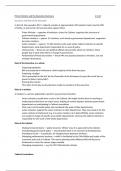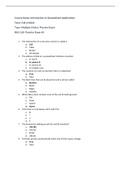Prime Minister and the Executive Summary 2.3.24
Structure and Role of the Executive
In the UK, the executive (PM + Cabinet) consists of approximately 100 ministers (who must be MPs
of lords), as well as the civil servants who support them.
- Prime Minister -> appoints all ministers, chairs the Cabinet, organises the structure of
government departments.
- Cabinet ministers -> approx. 25 ministers, each heads a government department, supported
by junior ministers.
- Junior ministers -> approx. 75-100 ministers who work under Cabinet ministers in specific
departments: each department responsible for an area of policy.
- Civil Servants -> these are non-political officials who provide advice to ministers, these
people stay in post when there is change in government.
- Parliamentary Private Secretaries -> these MPs are unpaid assistants to ministers, but not
ministers themselves.
Role of the Executive as a whole
- Proposing legislation
Bills are proposed to Parliament, which majority of the time they pass.
- Proposing a budget
This is presented to the HoC by the Chancellor of the Exchequer to pass (the Lords has no
power to delay ‘money bills’).
- Running the country
This refers to the day-to-day decisions made by members of the executive.
Role of a minister
A minister is a person appointed to perform a government function.
- Senior ministers usually have a role in the Cabinet, this might involve them in reaching or
endorsing final decisions on major issues, helping to resolve disputes between government
departments or participating in Cabinet committees.
- Their role is to formulate policy and coordinate the work of their departments.
- Junior ministers support the senior ministers in their department. They may stand in for the
senior minister in Parliament (e.g. if a senior minister can’t attend PMQs). Junior ministers
are usually in charge of specific areas within departments, whereas the Cabinet minister is
responsible for the work of the whole department.
Role of the Cabinet
- Making formal decisions -> policy becomes ‘official’ once it is approved by the Cabinet.
- Coordinating government policy -> ensuring that there is an overview of developments.
- Providing a forum -> in particular, for disagreements between ministers.
- Managing parliamentary business -> which is facilitated by the Chief Whip and Leader of the
Commons and Lords in Cabinet. This means planning when different bills will be put to
Parliament to cover the various stages needed.
- Managing emergencies -> e.g. the 2017 Westminster attacks.
Cabinet Committees
, They are groups of Cabinet ministers designed to allow discussions and decisions to take place with
fewer ministers than in the full Cabinet. The PM has the power to set up Cabinet committees and is
responsible for appointing their members. Approx. 25 main Cabinet committees, chaired by the PM,
Deputy PM, Chancellor, or Home Secretary. Committees report back to the Cabinet with their
decisions, which the Cabinet usually feels obliged to accept.
Examples of Cabinet committees include: National Security Council, Home Affairs Committee,
Economic Affairs Committee, Scotland Committee, Social Justice Committee.
Is the Cabinet still important?
- Yes.
Cabinet discusses the government’s general strategy and goals.
In some circumstances, the Cabinet makes key decisions, e.g. whether to hold an election in
2017.
Some Cabinet ministers in charge of large departments are powerful in their own right.
No PM can survive without Cabinet support, and in some circumstances, Cabinets are able to
exert a lot of influence.
The Cabinet can overrule the PM or even remove them, e.g. Thatcher’s Cabinet famously
aided her department.
Under coalition, the Cabinet reconciles the differences between coalition partners, making
them more important.
It is Cabinet which deals with emergencies or crises, not the PM alone.
- No.
The PM has significant powers of patronage over the Cabinet.
PMs rely less on their Cabinet for policy advice, preferring to use special advisors.
Collective responsibility gives PMs power to silence dissenters in the Cabinet.
PMs control the workings of the Cabinet by shaping the Cabinet’s agenda as well as chairing
meetings.
PMs decide the number and nature of Cabinet committees.
The growth of Cabinet committees is seen as a way for the PM to bypass the Cabinet as a
form of ‘inner cabinet’.
A Cabinet united behind its PM gives a PM enormous power.
Collective Ministerial Responsibility
It extends to all members of the government. The convention requires that they all stick to an
agreed policy and do not question it in public.
It is necessary because:
- It ensures ministers present a united front against opposition.
- It means that discussions inside the Cabinet remain private and disagreement remains
confidential.
- It binds the government together as ministers collectively shoulder responsibility for their
actions and policies.
The past decades have seen several internal battles and some of them have led to the downfall of a
PM. The PM must maintain some Cabinet unity to maintain their position in government.
Examples
May’s Cabinet






